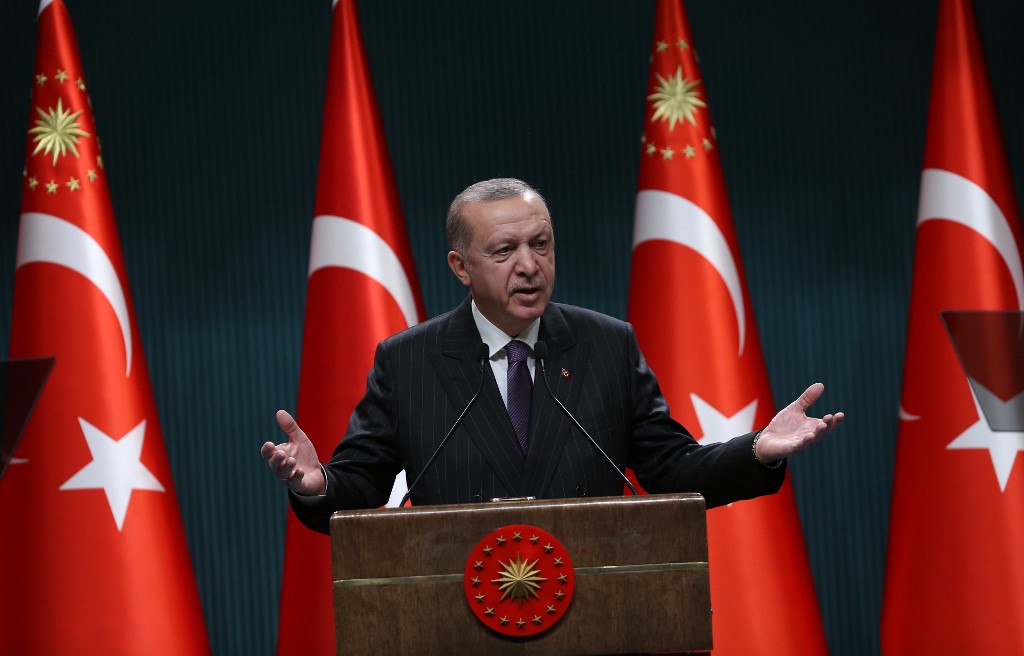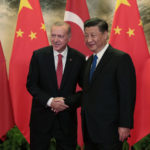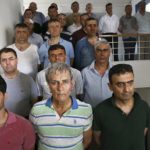Turkey, the world’s largest jailor of journalists, has launched a new “human rights” plan. The plan, the far-right authoritarian leader Recep Tayyip Erdogan claimed, would support due process, freedom of expression and an end to gender-based violence.
The same government recently sentenced in absentia journalist Can Dundar to 27 years in prison and has sentenced Canan Kaftancioglu, a opposition politician, to nine years for a tweet supporting peace.Read
How a country that imprisons journalists and opposition politicians can have laws on the free press and due process is unclear and has left many critics bewildered.
Last year, Turkey threatened most of its neighbors and spent time cementing ethnic cleansing in Kurdish areas it occupied in northern Syria, recruiting desperate Syrian refugees to fight foreign conflicts, trafficking weapons against a UN embargo to Libya, bombing northern Iraq and using drones for extrajudicial killings in Syria. Now this year, Turkey appears to want to put on a different face as a new US administration has come to power. Turkey knows that the Biden administration is prioritizing human rights and has invented this “human rights” campaign to dovetail with US foreign policy.
Turkey has a history of trying to angle for US support through using its state-controlled media to push various agendas that it thinks will appear to Washington. For instance, during the Trump era, Ankara would claim it was fighting ISIS, when it was not fighting ISIS. It would also try to claim that far-left Kurdish activists were part of “Antifa” to appeal to the Trump administration’s anti-Antifa comments.
Between 2016 and 2020, Turkey took a turn to the far Right, jailing opposition HDP politicians; pushing through new laws to make the presidency more powerful; invading Syria; and threatening Greece, Armenia, Israel and other countries. For instance, Turkey hosted Hamas terror leaders twice last year. At the same time, it purged hundreds of thousands of civil servants and academics and cracked down on gay rights.
Is Turkey’s “human rights” plan just virtue-signaling to try to forestall US criticism, or is it part of a process of creating a new constitution and seeking to turn itself into a one party state, making the opposition illegal?
It’s unclear what the long-term goal is. Turkey has no critical media after most of its critical journalists were arrested or driven into exile, and its pro-government media Anadolu and TRT have the same talking points.
Anadolu’s explanation of the plan’s points includes such concepts as “safeguarding the presumption of innocence, the right not to be labeled as a criminal.” The same government, when students protested, slammed them as terrorists and bashed gay rights protesters. Turkey’s Interior Minister Suleyman Soylu incited against the students with so many hate comments on Twitter that Twitter censured his tweets.
How can a government that calls homosexuals “deviants” and labels opposition politicians and students “terrorists” have a law about the presumption of innocence? Members of Turkey’s ruling party and its coalition partners have sought to ban the HDP party opposition, openly labelling them “terrorists.” This would seem to contradict the new “human rights” concept of not labeling people criminals.
How can Turkey, which Amnesty International, the Committee to Protect Journalists and Stockholm Center for Freedom label the largest jailor of journalists have a law on free expression, when anyone who critiques Turkey’s ruling party is imprisoned?
Turkey jailed activist Zehra Dogan for 600 days for being a journalist. She made numerous famous paintings in prison. In May 2020 Turkey jailed Banu Ozdemir, an opposition politician from Izmir, for posting a video of an anti-fascist song that was playing from a mosque’s loudspeaker. She was jailed for a tweet.
Turkish civil society rights activist Osman Kavala has been jailed and was also detained for 1,144 days without even being charged initially. Turkey now says its new human rights law would mean speedy trials, while the same Erdogan regime pushing the human rights law is the same one that has kept Kavala in prison. Turkey also jailed designer Barbaros Sansal.
Journalists and photographers, environmental activists, professors and politicians have all been imprisoned in Turkey for tweets and supposed crimes that wouldn’t be a crime in most countries in the world. One photographer was jailed for photographing police shooting of an innocent man, another for supposedly photographing a building of the intelligence arm of Turkey. The list of jailed journalists is almost endless, many of them have worked highlighted abroad, such as Fevzi Yazici. Add to that list Canan Coskun, Kzaim Kizil, Ruken Demir, Melike Aydin, Ahmet Altan, and others.
Turkey’s ruling party claiming it will push a human rights laws reads like the statements of Ayatollah Khamenei or former Iranian president Mahmoud Ahmadinejad talking about diversity and human rights and gun violence. Some have tweeted with hope that Turkey might be changing its ways, but others have noted Turkey is trying to jail and ban opposition parties.
By SETH J. FRANTZMAN
Source: JP



